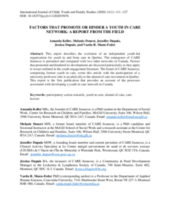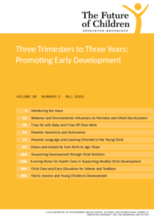Displaying 71 - 80 of 437
This guide summarizes findings from relevant literature on what helps emerging adults (including youth transitioning from foster care) succeed, describes examples of how US communities are innovating to meet those needs, and shares key takeaways from interviews with emerging adults.
This study draws on data from the [STUDY] and the National Student Clearinghouse to examine the roles that Education and Training Vouchers (ETVs) and campus support programs (CSPs) play in promoting college persistence for foster youth.
This report describes the evolution of an independent youth-led organization for youth in and from care in Quebec, Canada
This article provides recommendations for adapting the pediatric medical home (PMH) model for health care needs of youth in foster care.
This study used survey results to examine relationships between parental adverse childhood experiences (ACEs) and protective factors among a sample of 581 parents with young children (≤5 years) who were enrolled in child maltreatment prevention programs.
A qualitative program evaluation was conducted, including focus groups with 36 parenting young women who had participated in Passport to Parenting (P2P) initiative services and interviews with 11 key staff of the three partnering agencies.
This study examined the impact of health care education materials designed for foster youth, called ICare2CHECK. It was hypothesized that ICare2CHECK would increase nonurgent ambulatory health care use and decrease emergency/urgent care use.
This study examined the outcomes of a training aimed at enhancing child welfare practitioners’ use of data from the the Ontario Looking After Children (OnLAC) project for service planning related to young people’s educational outcomes.
This study examined the long-term effects of the Head Start early childhood program on foster children's developmental outcomes from ages 3–4 to 8–9.
This issue of the Future of Children focuses on the first years of life starting with in utero experiences.



